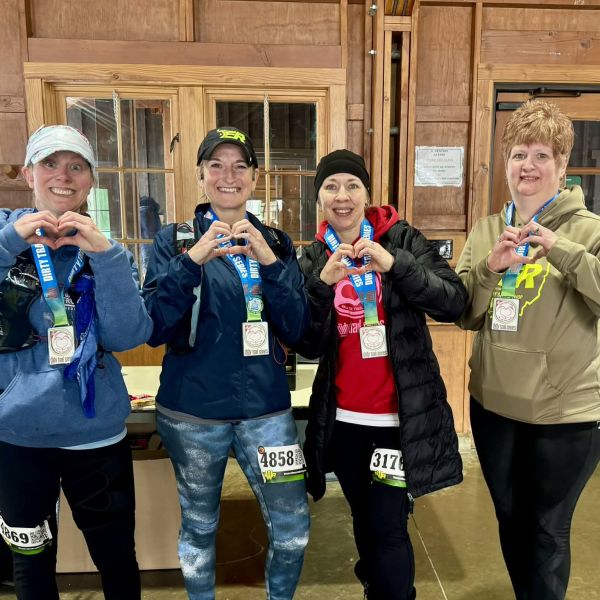Most races are full of positive vibes and friendly competition. But how do you handle poor sportsmanship when it rears it's ugly head?
Let's be honest...it happens. We just don't talk about it a lot.
But if you're not prepared, a runner's bad mojo could be a real downer with things like:
WeeViews Ambassador Brynn Cunningham met some bad-runner mojo at a race, and she wasn't entirely prepared for it.
Fortunately, with a little space since "the incident," time to reflect, and conversations with two coaching experts, she's got some sound advice to help you beat bad-runner mojo.
Hopefully, you don't cross paths with poor sportsmanship at a race.
But if you do, here's what you need to know...
The trail running community has a solid reputation for being a welcoming, supportive group of happy-go-lucky runners, from the front of the pack to the back.
Trail runners seem to care more about:
Sure, measurable outcomes, hitting goals and even making the podium are valid and important pursuits for some trail runners, including myself.
But those dreams and ambitions never inhibit me or most of us from:
Even more, I have rarely encountered a trail runner whose sights are set so high that they forget to be kind.
Sometimes, however, niceties are thrown to the wayside, and we would be amiss if we swept such behavior under the rug and acted as if all was always peachy keen.
I had just settled into a rhythm, away from the crowd of the start line, in the first mile of a 50k trail race, with one male runner behind me. His quiet company was a welcome comfort.
Then a female runner caught up to us.
“Well, this is a talkative group,” she said. It came off as sarcastic, because we were, in fact, not talking.
Neither one of us responded.
She continued to talk, saying these things:
I remained silent, giving zero reaction, until mile four when our male counterpart broke away, leaving just me and her.
She proceeded to talk to me, saying the following things:
In the past, my encounters in trail races, or any race for that matter, have been kind, cheerful, uplifting, nothing like this one, one-sided and full of bravado.
Anyway, if this banter were going to pivot in a more positive direction, I needed to speak up, because ignoring it obviously wasn’t working.
Finally, I spoke, changing the subject.
“Yay, they cut the grass!” I happily pointed at the sides of a section of the trail that had been overgrown a week ago.
Taking control of the conversation worked. I led with such topics as snakes, flowers, seasons and trails.
However, in hindsight, I prefer not to talk when I race, and I wish I would’ve politely said so.
Regardless, we carried on this way until she pulled ahead at mile 6.5.
Around mile 26, after a thunder and lightning storm so violent that it blackened the skies and flooded the trail from miles eight to 19, I arrived at the final aid station, hot, wet and bedraggled.
“You’re three minutes behind the first female,” said a volunteer.
I gave the last miles my all and crossed the finish, never passing another female.
Two minutes later, there she was - the woman from the early miles.
She was not happy.
As she rounded the parking lot lap toward the finish line, she was:
I stood, sad, confused, with friends and family.
Then it dawned on me. I must have passed her while she was off-course.
“Did I win?!”
“YES!” They said, and we laughed, while her anger escalated, and the typically celebratory, vibrant finish line vibe was squashed, at least for a little while.
My husband took me by the shoulders and walked me out of earshot.
To say the least, it was a buzz kill.
Unfortunately, at the same race the next year:
Since this experience, I’ve Googled:
None of these yielded useful results.
I decided to gather more specific insight from two professionals:
Donato A. Fanelle
Danielle Snyder
Ultimately, I believe that women have an opportunity to set a positive standard as competitors when they race.
Here's how:
Women (and men, for that matter) are capable of infusing the race atmosphere with equal amounts of power and grace, camaraderie and individuality.
“Women racing is still a newer thing,” says Snyder. “The disproportion of women to men in races is huge, and we are still learning how to take our space. This generation is newer. Before, women were racing recreationally, but now women are training competitively and breaking records, and there’s a belief that in order to be the best you have to be alone. But I wish that more women could see that being competitive doesn't mean putting other women down.”
“Women get a bad rep for being competitive...be competitive within your sport not your words,” Snyder says.
“We don’t have to be best friends, but we should not be intimidated and create unhealthy dynamics.”
So, I call on women to own their competitiveness for the betterment of all women in sports, but not at the expense of others.
Most women in trail running already embody the spirit of empowerment and good sportsmanship, which is one reason the sport is so awesome. Keep it up, ladies!
“You should have enough belief in yourself to use your skills,” Snyder says.
“Strong women empower other women. The faster our times, the stronger we become, the more we can improve as a gender.”
So what happens when you cross paths with some bad-runner mojo and poor sportsmanship at a race?
Don't let one sour runner ruin your experience.
Here are SIX ways to help you handle the situation:
Races can be emotionally fueled experiences.
“With every decision in life, you’re at a crossroads with an emotionally-driven decision, but when you make a values-driven decision, it’s worth it in the long run," says Fanelle.
"There’s pay off, integrity. Making a values-driven decision gives you a sense of pride. Be the bigger person, keep working hard and set a good example. You feel good about yourself for doing it the right way."
“The reality is we’re running in fight, flight or freeze,” says Snyder.
Someone coming up behind us can make us feel insecure, she explains, and prompts us to ask ourselves, “What do I need in order to do my best in this situation?”
Uncontrollable variables, such as acts of poor sportsmanship, can pop up at any moment in a race.
“Think about what you have control over," says Snyder.
"You do not have control over how people communicate, how people approach things, how people are. We do have control over how we respond in order to keep our boundaries and keep our space safe."
Fanelle expands upon that idea:
“When you have someone trash talking, you can choose to focus on that person or focus on what you can control. The person doing the trash talking wants to get a rise and a reaction. So talking about flowers and trails allows you to focus and to control what you can control.”
As the minutes and hours go by in a race, it can become progressively more difficult to stay focused.
Fanelle explains that someone who is using trash talk as a strategy has ultimately become distracted from the race.
“Focus is a skill," says Fanelle.
"You can train your focus, and you can train your focus to notice distractions. Focus cues trigger you to get you back to where you need to be.”
Fanelle provides some examples of focus cues, which can be silently repeated to oneself:
Fanelle explains that focus cues can also be an action, like looking out in the distance and slowly bringing the gaze back to right in front of oneself, over and over.
With a voice of congeniality, a smile and carefully chosen words, we can express our needs and wants without risking offending anyone, particularly with strangers who are throwing around flexes and arrogance.
“It’s how you say it,” Fanelle emphasizes.
He explains that runners can let fellow runners know that they don’t want to talk by politely saying things like:
Another useful phrase to use with people who are making you feel uncomfortable is to simply say, “that makes me feel uncomfortable” in a matter-of-fact way.
“Saying something like ‘that’s not the type of sportsmanship that I want to be around’ is always OK,” Snyder adds.
These phrases are a means to establish personal boundaries, the next tip in this list.
We plan our pace, fuel and gear.
So why not plan for potentially-negative interactions with fellow racers?
Snyder says that she uses her headphones as a means to create a sacred space for herself in a race environment.
(Check race rules before committing to headphones).
Snyder compares creating boundaries to the window in a limousine or taxi that divides the front seats from the back.
“In my head I envision pressing a button, and a wall comes up, and I say something or give myself space.”
To put physical space between herself and someone, Snyder suggests inviting the person to go ahead, or to pull away.
“If I’m feeling dysregulated, I’ll step over and say, ‘why don’t you pass me?’ or I’ll speed up.”
The Golden Rule provides simple guidance for race day:
In addition, I always come back to the same truth:
Above all, racing is a privilege in a world full of trauma, disaster and heartache.
So let’s honor our races as special, sacred, social spaces, where all runners can feel accepted, understood, safe, supported, at peace and loved.
After all, as Mitch Albom penned in his book Tuesdays with Morrie:
“Love wins. Love always wins.”

Login to your account to leave a comment.





We Want to Give it to You!
